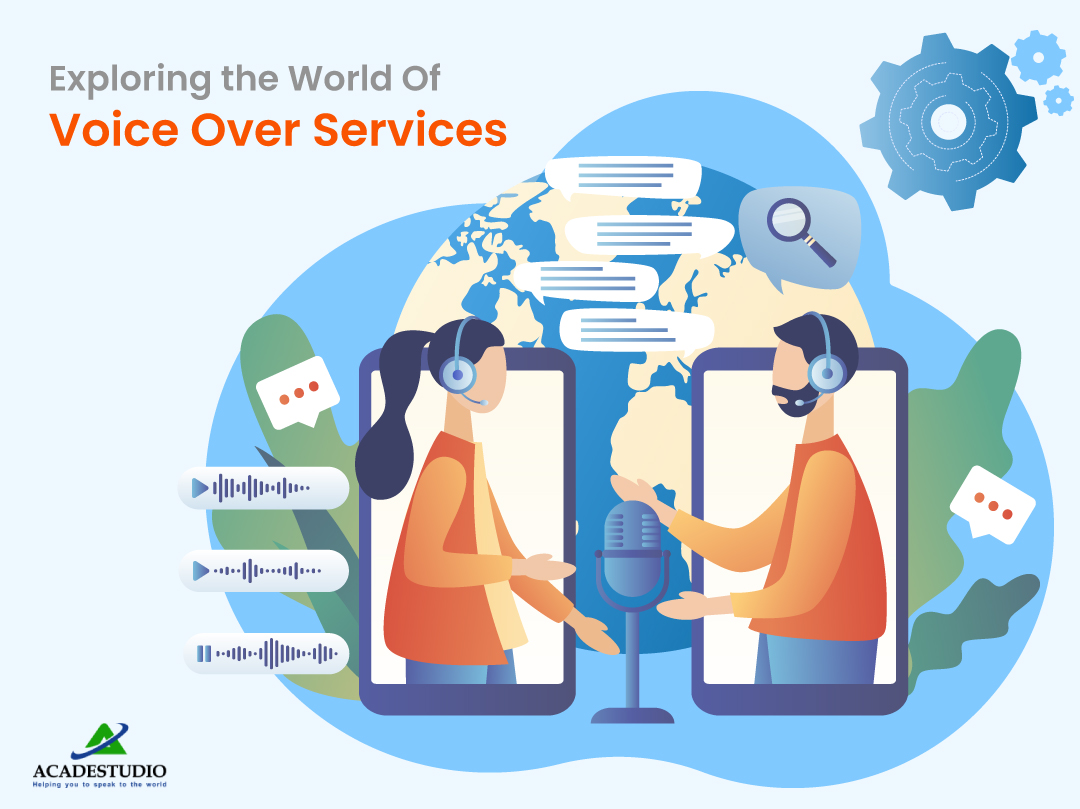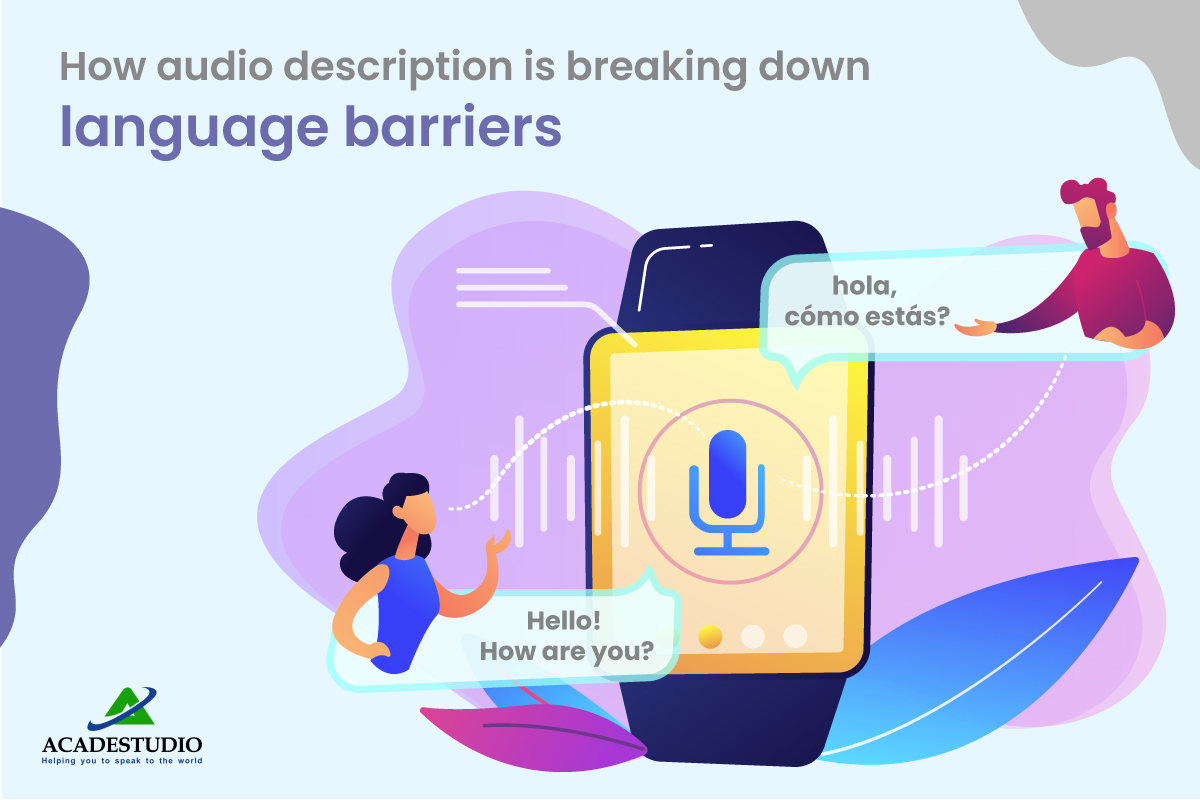Globalization is no longer a dream of tomorrow. Millions of business organizations are eyeing to set their footprints in the international markets. But, the process is easier said than executed because it is vast. Organizations need the best content localization services besides finding prospective markets and researching them.
Localization Services Definition
Before diving into content localization, let us learn about localization services in general. The localization service definition states that all the services that help clients deliver their audio, video, and textual content in the native language of the target audience are localization services. It includes dubbing, translations, subtitling, interpretation, and much more.
Non-English speaking countries form over 80% of the total world’s population. In such cases, it is evident that organizations place localization on top of the priority list.
As of now, there are tons of localization companies offering services. After learning about the localization service definition, it is clear that organizations must pick a professional service that meets all their requirements in the best possible manner.
However, regardless of how big or small your organization is, it isn’t immune to localization problems.
Mistakes and errors in localizing content are something all brands have faced once. While sometimes the localization company is to blame, other times, the reasons are different. No matter what the reason is, the fact is that no organization wants to deal with such issues.
This blog will talk about companies’ top ten content localization mistakes here.
Common Content Localization Mistakes
Trusting Machine-Based Content Localization Services
Do not get us wrong; we also know what benefits machine content localization services deliver. Features like faster translation speeds, cost-effective nature, and more make them quite appealing. Also, it puts less pressure on the company’s localization teams.
But different things make machine translation solutions the arch-rival of localization.
- Firstly, localization of translated content is different from translating technical documents.
- Localizing content requires it to pass through a series of transformations, not just through linguistic means.
- Machine translation speeds up the process, which is appreciable. But, it never combines cultural contexts into content while translating it.
- Machine translation fails in translating and localizing speeches, idioms, casual languages, or other non-technical stuff.
- Localization faces a significant setback if done through machine translation as it does not have human intelligence.
- Artificial intelligence is wiser than human intellect in many streams, but not always.
Machine translation miserably fails in localizing content. That is why choosing localization companies that rely only on machine translation is the first mistake.
Ignoring Space Requirements and Limitations
Different languages have different text sizes and font structures. It is, thus, crucial for organizations to have an initial idea of space requirements or limitations.
For example, any random sentence like “Connect with us today” is small in English. But the same sentence in German, “Verbinden Sie sich noch heute mit uns,” or in French, “Connectez-vous avec nous aujourd’hui,” is bigger.
Also, some languages like Hebrew and Arabic have a right-to-left synchronization, which is not the same as English.
What most organizations do is ignore space limitations. Maintaining size is essential if your organization is localizing content on business websites or mobile application software.
Keeping adequate space, which is twice that of the English sentence, is a crucial step that most organizations miss. What they get in return is a wrong format and structure that ruins their SEO factor too.
Generating a Different Meaning Altogether
A big failure of content localization services is the inability to convey the “right” brand message. Even multi-billion dollar companies like Apple and KFC have faced such mistakes in their globalization approaches.
Therefore, it is vital for organizations to only look for professional localization services. Although they don’t guarantee 100% errorless content localization, their records are better than others.
Another mistake that localization companies make is translating the names of places, products, or services. Translating such names create confusion for the audience, losing the brand’s credibility.
Both of these errors are common in localization services. Thus, organizations must be more careful while translating and localizing different types of content.
Localization Services Definition Includes the Localization of Payment Methods
Different countries have different payment methods and currency units. Organizations looking to develop their markets in foreign countries should do extensive research. They should dig out the target region’s currency and its equivalent value with USD.
They should also look for the most used or popular payment methods specific to a particular region or country, for example, PayPal in the United States or GPay in India. But that does not mean GPay is invalid in the United States or vice versa.
One of the most common localization errors is keeping the payment methods the same. Sometimes, these organizations forget to change the product’s price tags from the source unit to the target unit.
While these problems are products of poor localization services, their correction is relatively simple.
Localization Services Definition About Political Opinions
Political matters are much like an emotional nutcracker. The audience is an emotionally sensitive group of people. They have a substantial choice and connection when it comes to political context. Picking up political instances in content can make your content sound judgmental. It might look partial and offensive even when your organization has no intentions of doing that.
Therefore, introducing political content in content localization services is one of the mistakes that localization companies make.
The more companies keep such topics at bay, the more prominent the localization services become. Organizations should inform their localization companies to avoid talking about sensitive issues like politics.
Content Localization Services Sometimes Fail to Separate Weekends from Weekdays
In different parts of the world, “weekdays” mean a week that starts on Monday and ends on Friday. Saturday and Sunday are the weekend days.
On the other hand, Middle East countries consider Fridays and Saturdays as a weekend.
When your organization localizes content, they need to understand and focus on the target region and their weekly holidays. Many localization companies forget about this change, thus leading to unwanted issues in the content.
Thinking Only About the Language?
As stated earlier, localization differs from translation services in many aspects. While translation does a minute shift from one language to another, localization takes the game ahead.
Content localization services focus on the region and make the context suitable for the local audience. Therefore, localization services should have minute parts of cultural references, localized terms and expressions, and different expressions.
Localization companies should avoid mistakes, look for alternate date formats, and change currency and payment methods. Also, many other features are essential to localize content.
Coming back to what mistakes companies make is that they give their complete focus only on the language. They will ensure zero errors in the translation process but ignore the industrial guidelines of localization.
Losing Great Content Titles in Bad Localization
Your organization’s content should always look fresh and straight out of the writing department. That is how the content will engage customers and make them feel like it has been created exclusively for them. Similarly, having a catchy and engaging title is equally important.
However, lousy localization companies often mess up the title in the target language. Modifying the title is okay only if the localization experts design an equally enthralling title. But the companies fail to do this and end up ruining your content’s first impressions.
This factor also marks the need and importance of professional companies. Those companies will have language experts who will use their expertise to create unique titles that inspire the audience.
Believing Expensive Content Localization Services Are the Best
It is a popular misconception that organizations have while connecting with expensive localization companies. Organizations need to understand that not all costly services are invaluable as gold. Therefore, spending money like there’s no tomorrow is simply foolish.
Many organizations in the industry believe that the best services of content localization services come wrapped in gold emblems. But the reality is quite the reverse as most reputed companies offer affordable services.
Thus, companies must do basic field research on localization companies. They can easily find professional companies that provide better services at lower price rates.
Stop Rushing All At Once
Different organizations rush to as many new international markets as possible. But as per the localization services definition, clients must approach the process slowly. Instead of going with the flow and working with many localization companies together, they must work with one service provider at a time. They must conduct thorough market research and then partner with a company most suitable for the localization needs of a particular country.
So, what is the outcome of rushing? Clients find the quality of the localized content poor with lots of expenditure.
In these cases, the content localization services are not to be blamed. In this scenario, the organizations only waste their funds and resources to tick the boxes.
This practice isn’t new, as organizations have been doing this for years. It doesn’t count as a mistake but as a severe threat to its future in the long run.
How Does Picking The Right Content Localization Services Help?

After reading the top ten most common mistakes companies make while choosing localization companies, it must be clear that selecting the best one can hinder the chances of facing these issues.
Content localization services will help your organization in multiple ways. They will provide the reliable support required to enter and prosper in a foreign market. It is a new region; therefore, the organization’s approach will decide its fate. And that fate is designed by the localization company's multilingual team and localization experts. They will enhance the client’s brand reach, ROI, audience engagement, and customer conversion rates.













- From Mobile - 11 min ago
Bring to the table win-win survival strategies to ensure proactive domination. At the end of the day, going forward, a new normal that has evolved from generation X is on the runway heading towards a streamlined cloud solution.
- From Mobile - 7 min ago
Capitalize on low hanging fruit to identify a ballpark value added activity to beta test. Override the digital divide with additional clickthroughs from DevOps. Nanotechnology immersion along the information highway
- From Web - 2 min ago
A new normal that has evolved from generation X is on the runway
- From Mobile - 11 min ago
Capitalize on low hanging fruit to identify a ballpark value added
- From Web - 2 min ago
Real-time will have multiple touchpoints for offshoring.